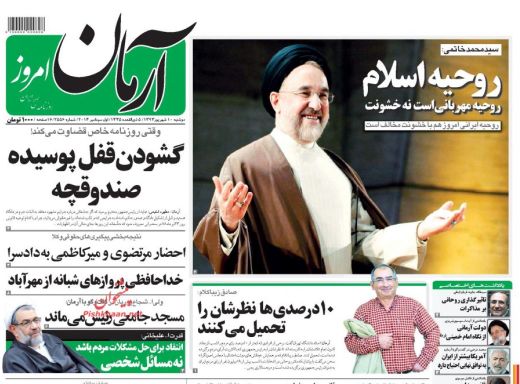Cultural interactions are instrumental in bringing communities closer together, said Mohammad Khatami, who heads the International Center for Dialogue among Cultures and Civilizations, after he visited an exhibition of hand-woven carpets by Razi Miri at the House of Artists in Tehran. On Monday September 1, Arman-e Emrooz, a Tehran-based daily, published an excerpt of the comments of the former Iranian president. The following is a translation of the daily’s coverage:
“We are appalled by what is happening in Gaza today and sympathize with the oppressed people of Palestine. That is what our Iranian-Islamic culture instructs. In our culture, which is widely known as being a sympathizer with those subjected to injustice, the savagery that state-sponsored terrorism imposes on the Palestinians is condemned,” the head of the International Center for Dialogue among Cultures and Civilizations said.
The fact that 113 Surahs [chapters] of the holy Koran start with ‘In the name of God, the Compassionate, the Merciful’ rather than ‘In the name of God, the Revengeful” suggests that the holy book keeps reminding the faithful of the importance of compassion and mercy and that Islam promotes compassion rather than violence.
Recalling the peaceful coexistence of Muslim Iranians with followers of other faiths, he said, “Once when I was in a Western country, I announced that ‘Iranians are not anti-Semitic.’ I said in Iran Muslims, Jews, Zoroastrians and Christians live side by side. Although many states have subjected Muslims and non-Muslims alike to injustice, in Iran followers of different faiths co-exist. Anti-Semitism and Holocaust are the products of the Western culture; in Iran the culture of tolerance, support for the weak, and coexistence prevails. This attribute is engraved in Iranian culture and is underlined by the Muslim faith.”
The former president described the Iranian-Islamic culture of the nation as what draws a distinct line between the Iranian people and those who commit acts of violence in the name of Islam, and said, “The fact that 113 Surahs [chapters] of the holy Koran start with ‘In the name of God, the Compassionate, the Merciful’ rather than ‘In the name of God, the Revengeful” suggests that the holy book keeps reminding the faithful of the importance of compassion and mercy and that Islam promotes compassion rather than violence.”
He added, “If there has been war and Jihad in our land, it has been inspired by the anti-violence instructions of the Prophet and his infallible household. We have simply put up defense when we have been subjected to aggression. Was the 8-year war [Saddam’s Iraq] imposed on us anything other than self-defense? We were minding our own business. They attacked us, and the Iranian people acted in self-defense, such resistance is holy.”
When we are subjected to acts of violence, we will put up resistance and stand up for our rights as we are required to. This is another Iranian trait which has its roots in Islam.
Mr. Khatami expressed regret over the fact that a bunch of extremists hide behind the concept of Jihad to kill other people, decapitate anyone they dislike, and sell women and asked, “Is this violent behavior compatible with the instructions of Islam?”
He went on to say that violence in any form or shape, whether in relations between the state and people or in relations among members of the public is unacceptable. “However, when we are subjected to acts of violence, we will put up resistance and stand up for our rights as we are required to. This is another Iranian trait which has its roots in Islam.”
It is appalling to see that some are hiding behind Islam to commit all kinds of crimes, including beheading, and violate all moral principles and at the same time brazenly cast themselves as true believers of the faith.
The head of the International Center for Dialogue among Cultures and Civilizations went on to say that infusion of Shiism into Iranian mentality has led to the emergence of a calm, patient and immortal trait among Iranians who have maintained their high spirit and remained unbroken throughout history despite experiencing failures, sufferings, aggressions and famine. They have also pinned their hope on a future built on the foundation of compassion, cordiality and mercy. “Iranians have always favored amicable relations between the state and the public, similarly, they want friendly relations between them and other nations.”
He added, “Immorality in the modern world has made life difficult on the international stage. Respect for others is an outstanding quality of the Iranian culture.”
Mr. Khatami stated, “The Prophet of Islam has openly declared that his mission is to help morality evolve. It is appalling to see that some are hiding behind Islam to commit all kinds of crimes, including beheading, and violate all moral principles and at the same time brazenly cast themselves as true believers of the faith.”
He described Iran as being among a handful of countries that have overseen the emergence of great civilizations and said, “Civilizations are a manifestation of social grandeur. On the one hand, culture creates civilizations, and on the other it reflects civilizations.”
After inspecting various sections of the exhibition, Mr. Khatami said that Persian rugs perfectly mirror the Iranian mindset as well as delicacy and beauty. “The creators of such beauty experience a lot of difficulty to make life beautiful for others.”
